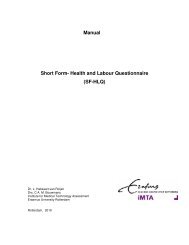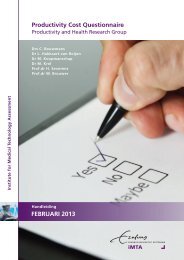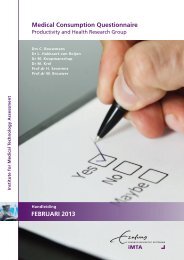110Chapter 7In the early 2000s, our research group performed economic evaluations oftreatment of congenital anorectal malformations (ARM) and congenitaldiaphragmatic hernia (CDH). 24-26 The results may briefly be summarized asfollows. The direct medical costs were found to be considerable, with long-termcosts after the initial treatment being only a fraction of these costs. HRQoL inpatients once treated for ARM and now between 1 and 4 years of age was lowerthan that of the general population. The older children showed better HRQoL.Although surgery for ARM was associated with substantial residualsymptomatology, patients aged 16 years and over showed hardly any HRQoLdifferences with population standards. We found CDH to be still associated withhigh mortality rates, despite the many advances in treatment over recentdecades. Although respiratory difficulties and stomach aches were reported,HRQoL in CDH survivors did not differ significantly from that of the generalpopulation. Costs per quality-adjusted life year (QALY) amounted to € 2,482 forARM and € 2,434 for CDH treatment.How to interpret cost-effectiveness ratios?Seeing that cost-effectiveness ratios like these are not very informative inthemselves, we need to bring in figures from other health care programs forcomparison to draw meaningful conclusions. Put in the perspective of the manytimes higher cost-effectiveness thresholds that seem to guide public authorities indecisions to accept or reject a technology, the costs per QALY we calculated forARM (€ 2,482) and CDH (€ 2,434) are clearly very modest. Examples of suchthresholds are those of the UK National Institute for Clinical Excellence (about£ 35,000 or £ 40,000 per QALY, which equals € 52,000 or € 60,000 at currentexchange rates) 27 or the Australian Pharmaceutical Benefit Advisory Committee(between AU$ 42,000 and AU$ 76,000 per life-year, which is approximately€ 27,000 and € 48,000). 28 In the Netherlands, a threshold of approximately€ 18,000 per life-year is sometimes seen as an acceptable cost-effectivenessratio. 29In the context of this chapter, we shall assume that our encouraging results alsoapply to surgical treatment of other congenital anomalies. This assumption seemsfairly plausible, since ARM and CDH were not selected randomly but purposefullychosen as being opposite extremes in terms of mortality and morbidity. ARM ischaracterized by relatively low mortality and relatively high morbidity intoadulthood, whereas for CDH the opposite applies. Notwithstanding the diversity ofthe conditions, treatments are remarkably close in terms of cost-effectiveness.So, treatments for other 'isolated' anomalies such as Hirschsprung's disease andesophageal atresia are likely to be cost-effective as well. Because most neonateshaving to undergo surgery present with just one major anomaly, the overallconclusions drawn from our research are favorable for neonatal surgery ingeneral.
Cost-Effectiveness of Neonatal Surgery: First Skepticized, Now Increasingly Accepted 111The 2000 review updatedWe updated the earlier review cited above 18 to see whether recent years havebrought more empirical results. We searched the literature from the year 1999onwards for complete economic evaluations of both diagnostic and therapeuticinterventions in neonatal surgery. In spite of the fact that we applied liberalcriteria for inclusion—several studies, for example, only evaluated postoperativecomplication rates rather than more advanced patient outcome measures—weidentified no more than 11 relevant studies, including our economic evaluations inARM and CDH referred to earlier. Even though our review covered just a fewyears and only included studies published in English, the conclusion can only bethat the number of published economic evaluations in the field of neonatalsurgery is still small. Table 7.1 details the interventions investigated in all thesestudies, differentiating between the six groups of congenital anomalies listed byRavitch and colleagues 30 and other conditions. The authors predominantly drawfavorable conclusions on cost-effectiveness. What attracts attention is that,leaving our studies on ARM and CDH out of consideration, all studies except one(dealing with circumcision) concentrated on particular novel aspects of treatmentor diagnosis. So, drawing more conclusions on the entire treatment process ofneonatal surgery, next to our studies on ARM and CDH, is not possible.7.4 IS THERE A ROLE FOR ARGUMENTS OTHER THAN COST-EFFECTIVENESS?Above, we argued that it is not necessarily unethical to consider costeffectivenessarguments. However, we feel it would be unethical indeed to basedecisions on how much priority to give to a particular health care procedure oneconomic grounds exclusively. In the case of neonatal surgery, crucial ethicalquestions arise for example when considering whether therapy should be offeredor perhaps withheld, which often involve life-and-death decisions. In the case ofchildren with serious birth defects, the 'best interest' of the child may justifywithholding or withdrawing life-prolonging surgical intervention. There may befundamental uncertainties as to the child's future development, or in somesituations, a life strongly burdened by disability and dependency on life-supportsystems may be the ultimate outcome. 31-33 Treatment modalities that mayinvolve such ethical dilemmas include ECMO, the care for extremely prematureinfants, and prenatal diagnosis and fetal surgery. 34-38 Apart from ethicalarguments, religious, cultural, aesthetic, or legal aspects need to be considered inneonatal surgery, such as a child's right to be free of intrusive unnecessarymedical and surgical procedures before having reached the age of full and legaldiscretion (e.g., neonatal circumcision 39 ).
- Page 3:
COST-EFFECTIVENESS OF NEONATAL SURG
- Page 6 and 7:
DOCTORAL COMMITTEEPromotors:Prof.dr
- Page 9 and 10:
PUBLICATIONSChapters 2 to 7 are bas
- Page 11:
6ChapterINFORMAL CARE FOR CHILDREN
- Page 14 and 15:
2Chapter 11.1 BACKGROUND AND MOTIVA
- Page 16 and 17:
4Chapter 1provides a good overview
- Page 18 and 19:
6Chapter 1disability, and death of
- Page 21:
Introduction 9particular equity pri
- Page 25 and 26:
Introduction 1320. Oostenbrink JB,
- Page 27 and 28:
Introduction 1554. Heyman MB, Harma
- Page 29 and 30:
THE COST-EFFECTIVENESS OFTREATMENT
- Page 31:
Cost-Effectiveness of Treatment for
- Page 35 and 36:
Cost-Effectiveness of Treatment for
- Page 37 and 38:
Cost-Effectiveness of Treatment for
- Page 39 and 40:
Cost-Effectiveness of Treatment for
- Page 41 and 42:
Cost-Effectiveness of Treatment for
- Page 43 and 44:
Cost-Effectiveness of Treatment for
- Page 45:
Cost-Effectiveness of Treatment for
- Page 48 and 49:
36Chapter 3ABSTRACTBackground/Purpo
- Page 50 and 51:
38Chapter 33.2 MATERIALS AND METHOD
- Page 52 and 53:
40Chapter 3child's date of birth) a
- Page 54 and 55:
42Chapter 3diaphragm was closed (Ta
- Page 56 and 57:
44Chapter 3Total costs of treatment
- Page 58 and 59:
46Chapter 3Regarding the treatment
- Page 60 and 61:
48Chapter 3REFERENCES1. Stolk EA, P
- Page 62 and 63:
50Chapter 332. Jaillard S, Pierrat
- Page 64 and 65:
52Chapter 4ABSTRACTAims:To examine
- Page 66 and 67:
54Chapter 4Outcome measuresThe pati
- Page 68 and 69:
56Chapter 4Clearly, the symptoms st
- Page 70 and 71:
58Chapter 4The respondents did not
- Page 72 and 73: 60Chapter 4Table 4.4TAIQOL Scores o
- Page 74 and 75: 62Chapter 44.4 DISCUSSIONIn this pa
- Page 76 and 77: 64Chapter 4ACKNOWLEDGMENTSWe are in
- Page 78 and 79: 66Chapter 418. Coons SJ, Rao S, Kei
- Page 80 and 81: 68Chapter 5ABSTRACTObjective:Extrac
- Page 82 and 83: 70Chapter 5treatment. 26,27 Finally
- Page 84 and 85: 72Chapter 5CostsOnly direct costs w
- Page 86 and 87: 74Chapter 5summarized in Table 5.2.
- Page 88 and 89: 76Chapter 5Table 5.3 Direct Medical
- Page 90 and 91: 78Chapter 5Figure 5.3 illustrates o
- Page 92 and 93: 80Chapter 5severely ill newborns—
- Page 94 and 95: 82Chapter 5REFERENCES1. Bartlett RH
- Page 96 and 97: 84Chapter 533. Meinert CL: Extracor
- Page 98 and 99: 86Chapter 568. Hui TT, Danielson PD
- Page 100 and 101: 88Chapter 6ABSTRACTObjective:To inv
- Page 102 and 103: 90Chapter 6a rule. The health-relat
- Page 104 and 105: 92Chapter 6Regression analysis of h
- Page 106 and 107: 94Chapter 6that caregiving for thei
- Page 108 and 109: 96Chapter 6Table 6.5 CareQol Compar
- Page 110 and 111: 98Chapter 6children with a disabili
- Page 112 and 113: 100Chapter 6This study was of impor
- Page 114 and 115: 102Chapter 618. Poley MJ, Stolk EA,
- Page 116 and 117: 104Chapter 654. Boman KK, Viksten J
- Page 118 and 119: 106Chapter 7ABSTRACTMortality rates
- Page 120 and 121: 108Chapter 77.2 THE RELEVANCE OF CO
- Page 124 and 125: 112Chapter 7Table 7.1 Economic Eval
- Page 126 and 127: 114Chapter 7More from a policy pers
- Page 128 and 129: 116Chapter 7also expect that life-s
- Page 130 and 131: 118Chapter 7entirely justified, for
- Page 132 and 133: 120Chapter 723. Sydorak RM, Nijagal
- Page 134 and 135: 122Chapter 765. Glaser AW, Davies K
- Page 137 and 138: GENERAL DISCUSSION:A GUIDED TOURPRO
- Page 139 and 140: General Discussion: A Guided Tour P
- Page 141 and 142: General Discussion: A Guided Tour P
- Page 143 and 144: General Discussion: A Guided Tour P
- Page 145 and 146: General Discussion: A Guided Tour P
- Page 147 and 148: General Discussion: A Guided Tour P
- Page 149 and 150: General Discussion: A Guided Tour P
- Page 151: General Discussion: A Guided Tour P
- Page 154 and 155: 142GlossaryCharge (or: tariff)A pri
- Page 156 and 157: 144Glossaryefficient one. We are th
- Page 159 and 160: SUMMARY
- Page 161 and 162: Summary 149mortality. Finally, it i
- Page 163 and 164: Summary 151neonatal surgery. It is
- Page 165 and 166: SAMENVATTING
- Page 167 and 168: Samenvatting 155zoals directe niet-
- Page 169 and 170: Samenvatting 157Hoofdstuk 6 gaat ve
- Page 171: Samenvatting 159vereisen, waarvoor
- Page 174 and 175:
162AcknowledgmentsAlthough I am ind
- Page 176:
About the AuthorBorn in De Meern (N
















